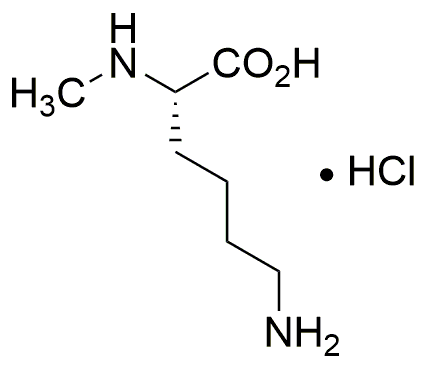Na-Methyl-L-lysine hydrochloride is widely utilized in research focused on:
- Biotechnology: It serves as a key building block in the synthesis of peptides and proteins, facilitating advancements in drug development and therapeutic applications.
- Nutrition: This compound is explored for its potential benefits in dietary supplements, particularly for muscle growth and recovery, appealing to athletes and fitness enthusiasts.
- Pharmaceuticals: It is used in the formulation of various medications, enhancing the efficacy of treatments for conditions like metabolic disorders.
- Cosmetics: The compound is incorporated into skincare products for its moisturizing properties, providing benefits for skin health and hydration.
- Research Studies: It is a valuable reagent in academic and industrial research, helping scientists understand amino acid metabolism and its implications in health and disease.
General Information
Properties
Safety and Regulations
Applications
Na-Methyl-L-lysine hydrochloride is widely utilized in research focused on:
- Biotechnology: It serves as a key building block in the synthesis of peptides and proteins, facilitating advancements in drug development and therapeutic applications.
- Nutrition: This compound is explored for its potential benefits in dietary supplements, particularly for muscle growth and recovery, appealing to athletes and fitness enthusiasts.
- Pharmaceuticals: It is used in the formulation of various medications, enhancing the efficacy of treatments for conditions like metabolic disorders.
- Cosmetics: The compound is incorporated into skincare products for its moisturizing properties, providing benefits for skin health and hydration.
- Research Studies: It is a valuable reagent in academic and industrial research, helping scientists understand amino acid metabolism and its implications in health and disease.
Documents
Safety Data Sheets (SDS)
The SDS provides comprehensive safety information on handling, storage, and disposal of the product.
Product Specification (PS)
The PS provides a comprehensive breakdown of the product’s properties, including chemical composition, physical state, purity, and storage requirements. It also details acceptable quality ranges and the product's intended applications.
Certificates of Analysis (COA)
Search for Certificates of Analysis (COA) by entering the products Lot Number. Lot and Batch Numbers can be found on a product’s label following the words ‘Lot’ or ‘Batch’.
Numéro de catalogue
Numéro de lot/série
Certificates Of Origin (COO)
This COO confirms the country where the product was manufactured, and also details the materials and components used in it and whether it is derived from natural, synthetic, or other specific sources. This certificate may be required for customs, trade, and regulatory compliance.
Numéro de catalogue
Numéro de lot/série
Safety Data Sheets (SDS)
The SDS provides comprehensive safety information on handling, storage, and disposal of the product.
DownloadProduct Specification (PS)
The PS provides a comprehensive breakdown of the product’s properties, including chemical composition, physical state, purity, and storage requirements. It also details acceptable quality ranges and the product's intended applications.
DownloadCertificates of Analysis (COA)
Search for Certificates of Analysis (COA) by entering the products Lot Number. Lot and Batch Numbers can be found on a product’s label following the words ‘Lot’ or ‘Batch’.
Numéro de catalogue
Numéro de lot/série
Certificates Of Origin (COO)
This COO confirms the country where the product was manufactured, and also details the materials and components used in it and whether it is derived from natural, synthetic, or other specific sources. This certificate may be required for customs, trade, and regulatory compliance.


